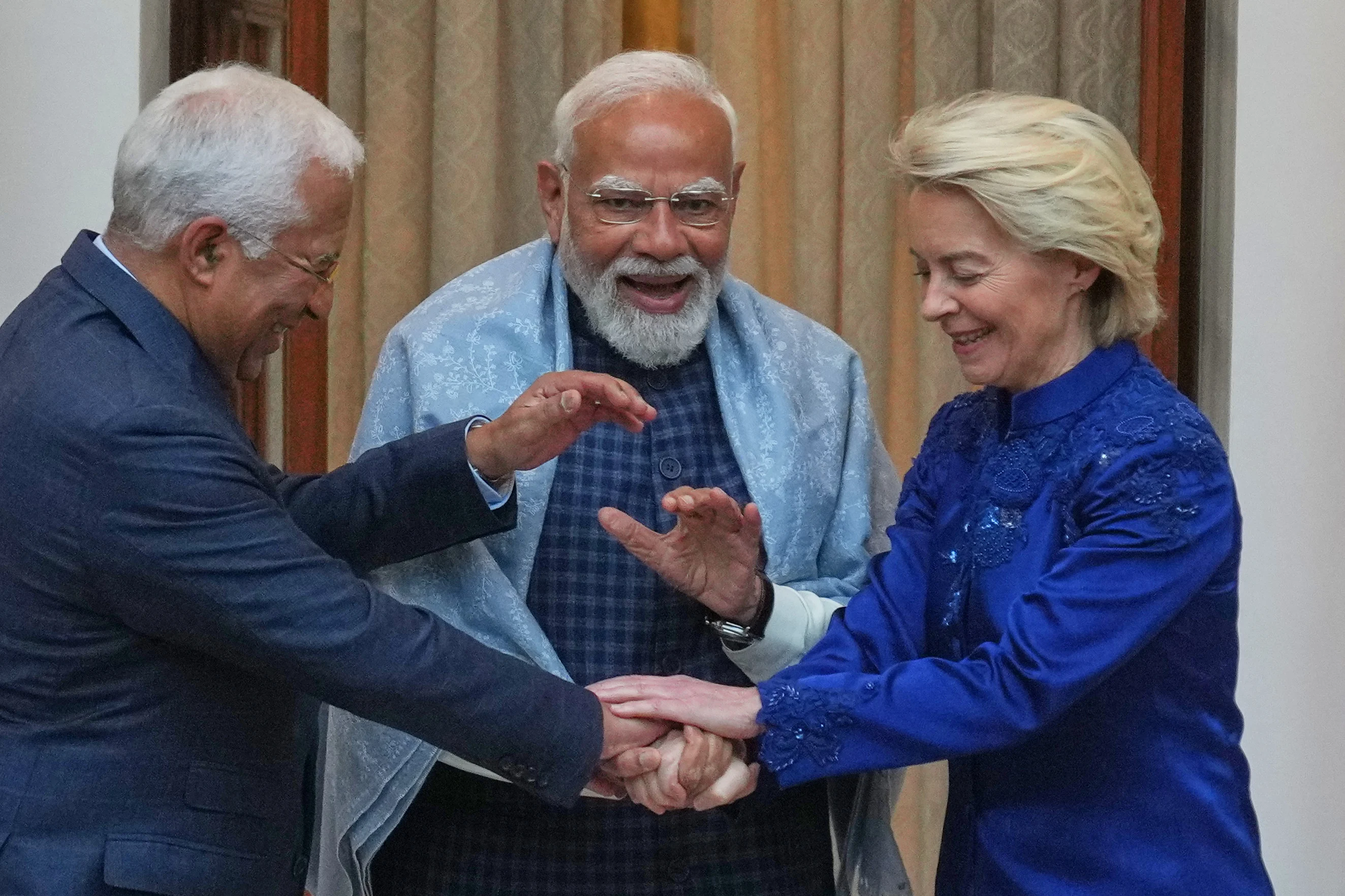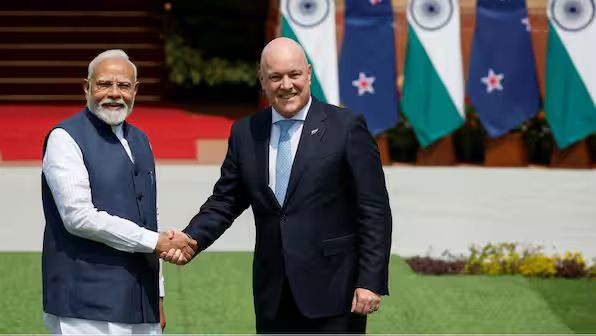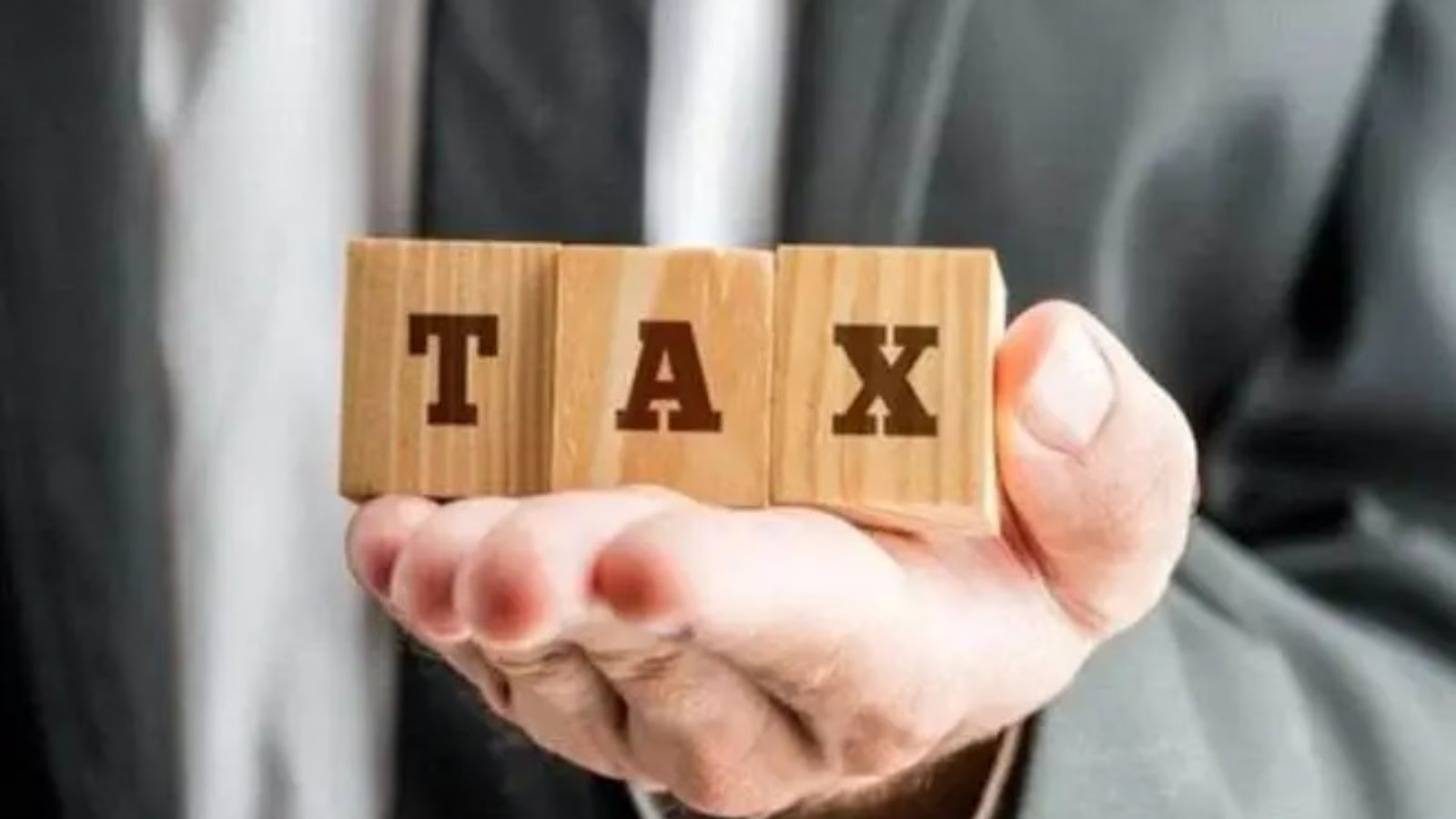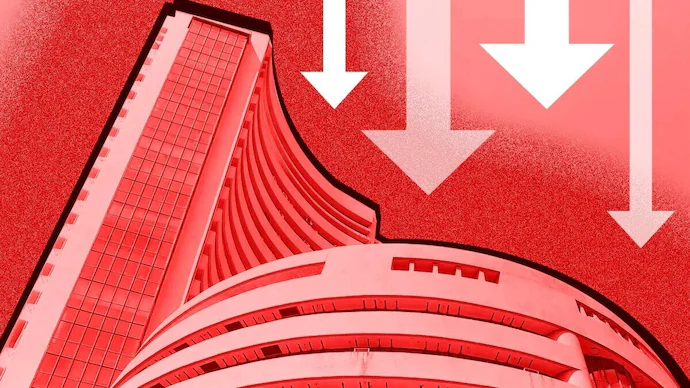Top Trending Business News & Highlights


One accord, three setbacks India's use of the EU trade pact to boil Turkey, Pakistan, and Bangladesh
The United States has also been affected by India's trade agreement with the European Union. The historic trade deal between India and the EU would not only affect Bangladesh and Pakistan but also the United States and Turkey. The agreement calls for the elimination or reduction of tariffs on more than 90% of EU goods exports to India, including hefty charges of up to 44% on machinery, 22% on chemicals, and 11% on pharmaceuticals, which will be phased down over time.Following nearly two decades of negotiations, officials announced on Tuesday that India and the European Union have achieved a free trade agreement to strengthen economic and strategic ties. Up to 2 billion people might be impacted by the agreement, which the president of the EU's executive body referred to as the "mother of all deals." The accord won't go into force for some months. The agreement between two of the largest markets in the world comes as Washington imposes high import taxes on both the EU bloc and the Asian behemoth, upsetting long-standing trade patterns and forcing major economies to look for new alliances. The FTA, which both India and the 27-nation EU refer to as "the mother of all deals," provides a "decisive boost" to the labor-intensive textile industry by improving price competitiveness and expanding market access in one of the most sophisticated consumer markets in the world, according to a note released today by the Indian Textile Ministry.
Published 29 Jan 2026 12:51 PM


India and New Zealand wrap up free trade negotiations despite persistently high US tariffs
Free trade agreement (FTA) talks between India and New Zealand came to an end on Monday amid hefty US tariffs that have unsettled investors and led to the cancellation of orders from India's biggest export market. In the context of 50% US tariffs, the New Zealand agreement, if signed, would be India's second free trade agreement (FTA) following the Oman agreement. It would also be the country's third accord this year as it works to diversify its exports.According to information made public by the government, Wellington would remove tariffs on 100% of its tariff lines for all Indian exports, while India has committed to lower tariffs on 95% of New Zealand exports. However, New Zealand's typical tariffs are among the lowest in the world—between two and three percent—and their removal could not immediately boost exports. In order to bring some symmetry to the agreement, New Zealand has "committed" to investing $20 billion in India over the next fifteen years in exchange for market access in a rapidly expanding Indian consumer market that is subject to high tariffs (over 15%). Because of the unfair tariff rates, New Zealand may benefit more from goods trade than India.In 2024–2025, bilateral trade between India and New Zealand was only $1.3 billion. "This FTA opens doors for Indian businesses in the region through well-integrated directional exports and gives our youth choices to learn, work, and grow on a global stage," stated Commerce Minister Piyush Goyal."India's strengths are expanding exports, supporting labor-intensive growth, and power services," stated Commerce Secretary Rajesh Agrawal. New Zealand's access to India's sizable and expanding economy is deeper and more reliable. These qualities are brought together by the migration of individuals, professionals, students, and skilled workers. The FTA contains provisions to address non-tariff barriers through improved regulatory cooperation, transparency, and streamlined customs, sanitary and phyto-sanitary (SPS) measures, and technical barriers to trade disciplines, according to the Commerce and Industry Ministry, in addition to tariff liberalization. According to the Ministry, "all systemic facilitations and fast-track mechanisms for imports that serve as inputs for our manufactured exports ensure that tariff concessions translate into effective and meaningful market access."
Published 22 Dec 2025 10:28 PM


What workers, brokers, and policyholders stand to gain from travelers' agreement to preserve 1,400 jobs in Canada
The Canadian business of Travelers will be acquired by Definity Financial Corp. The total value of the acquisition is $3.3 billion. Definity will become the fourth-largest property and liability insurer in Canada as a result of this transaction. Every one of Travelers Canada's 1,400 employees will continue to work there. Consumers can anticipate competitive pricing and additional options. Regulatory permission is needed for the deal. By early 2026, it should be closed.Definity Financial Corp. plans to pay $3.3 billion to acquire the Canadian operations of the US behemoth Travelers, one of the largest transactions in Canada's insurance industry in recent memory. This merger could change the competitive environment for both insurers and consumers. More than 1,400 Traveler employees across Canada will retain their employment when the two companies combine under a single brand, despite the fact that large acquisitions frequently result in job losses.Definity will move up from sixth place to become Canada's fourth-largest property and liability insurer as a result of the purchase. Its expanding presence in the insurance industry is demonstrated by the $6 billion in total yearly premiums it currently manages.
Published 28 May 2025 07:58 PM


Why did India decide to remove the "Google tax" in response to pressure from the US?
The Center intends to eliminate the 6% equalization levy (EL) it levies on digital advertisements as part of the 35 modifications to the Finance Bill, 2025, effective April 1, 2025.The Central government has suggested to eliminate the equalization levy on internet advertisements as part of revisions to the Finance Bill, 2025, a move that is anticipated to help American large technology companies and allay US worries about India being a high tariff country.As part of changes to the Finance Bill, 2025, the central government has proposed doing away with the equalization levy on online ads. This is expected to benefit big IT companies in the US and ease concerns about India being a high-tariff nation.The equalization charge, also referred to as the Google tax, will be eliminated by the Center on April 1. The clause is one of 59 changes to the Finance Bill that Finance Minister Nirmala Sitharaman made on Monday and presented to Parliament.
Published 25 Mar 2025 08:42 PM


Business
Business globally are the pillars of any economy and they contribute in huge amount to take any country ahead financially and economically and boost the country grwoth.


One accord, three setbacks India's use of the EU trade pact to boil Turkey, Pakistan, and Bangladesh
The United States has also been affected by India's trade agreement with the European Union. The historic trade deal between India and the EU would not only affect Bangladesh and Pakistan but also the United States and Turkey. The agreement calls for the elimination or reduction of tariffs on more than 90% of EU goods exports to India, including hefty charges of up to 44% on machinery, 22% on chemicals, and 11% on pharmaceuticals, which will be phased down over time.Following nearly two decades of negotiations, officials announced on Tuesday that India and the European Union have achieved a free trade agreement to strengthen economic and strategic ties. Up to 2 billion people might be impacted by the agreement, which the president of the EU's executive body referred to as the "mother of all deals." The accord won't go into force for some months. The agreement between two of the largest markets in the world comes as Washington imposes high import taxes on both the EU bloc and the Asian behemoth, upsetting long-standing trade patterns and forcing major economies to look for new alliances. The FTA, which both India and the 27-nation EU refer to as "the mother of all deals," provides a "decisive boost" to the labor-intensive textile industry by improving price competitiveness and expanding market access in one of the most sophisticated consumer markets in the world, according to a note released today by the Indian Textile Ministry.


India and New Zealand wrap up free trade negotiations despite persistently high US tariffs
Free trade agreement (FTA) talks between India and New Zealand came to an end on Monday amid hefty US tariffs that have unsettled investors and led to the cancellation of orders from India's biggest export market. In the context of 50% US tariffs, the New Zealand agreement, if signed, would be India's second free trade agreement (FTA) following the Oman agreement. It would also be the country's third accord this year as it works to diversify its exports.According to information made public by the government, Wellington would remove tariffs on 100% of its tariff lines for all Indian exports, while India has committed to lower tariffs on 95% of New Zealand exports. However, New Zealand's typical tariffs are among the lowest in the world—between two and three percent—and their removal could not immediately boost exports. In order to bring some symmetry to the agreement, New Zealand has "committed" to investing $20 billion in India over the next fifteen years in exchange for market access in a rapidly expanding Indian consumer market that is subject to high tariffs (over 15%). Because of the unfair tariff rates, New Zealand may benefit more from goods trade than India.In 2024–2025, bilateral trade between India and New Zealand was only $1.3 billion. "This FTA opens doors for Indian businesses in the region through well-integrated directional exports and gives our youth choices to learn, work, and grow on a global stage," stated Commerce Minister Piyush Goyal."India's strengths are expanding exports, supporting labor-intensive growth, and power services," stated Commerce Secretary Rajesh Agrawal. New Zealand's access to India's sizable and expanding economy is deeper and more reliable. These qualities are brought together by the migration of individuals, professionals, students, and skilled workers. The FTA contains provisions to address non-tariff barriers through improved regulatory cooperation, transparency, and streamlined customs, sanitary and phyto-sanitary (SPS) measures, and technical barriers to trade disciplines, according to the Commerce and Industry Ministry, in addition to tariff liberalization. According to the Ministry, "all systemic facilitations and fast-track mechanisms for imports that serve as inputs for our manufactured exports ensure that tariff concessions translate into effective and meaningful market access."


What workers, brokers, and policyholders stand to gain from travelers' agreement to preserve 1,400 jobs in Canada
The Canadian business of Travelers will be acquired by Definity Financial Corp. The total value of the acquisition is $3.3 billion. Definity will become the fourth-largest property and liability insurer in Canada as a result of this transaction. Every one of Travelers Canada's 1,400 employees will continue to work there. Consumers can anticipate competitive pricing and additional options. Regulatory permission is needed for the deal. By early 2026, it should be closed.Definity Financial Corp. plans to pay $3.3 billion to acquire the Canadian operations of the US behemoth Travelers, one of the largest transactions in Canada's insurance industry in recent memory. This merger could change the competitive environment for both insurers and consumers. More than 1,400 Traveler employees across Canada will retain their employment when the two companies combine under a single brand, despite the fact that large acquisitions frequently result in job losses.Definity will move up from sixth place to become Canada's fourth-largest property and liability insurer as a result of the purchase. Its expanding presence in the insurance industry is demonstrated by the $6 billion in total yearly premiums it currently manages.


Why did India decide to remove the "Google tax" in response to pressure from the US?
The Center intends to eliminate the 6% equalization levy (EL) it levies on digital advertisements as part of the 35 modifications to the Finance Bill, 2025, effective April 1, 2025.The Central government has suggested to eliminate the equalization levy on internet advertisements as part of revisions to the Finance Bill, 2025, a move that is anticipated to help American large technology companies and allay US worries about India being a high tariff country.As part of changes to the Finance Bill, 2025, the central government has proposed doing away with the equalization levy on online ads. This is expected to benefit big IT companies in the US and ease concerns about India being a high-tariff nation.The equalization charge, also referred to as the Google tax, will be eliminated by the Center on April 1. The clause is one of 59 changes to the Finance Bill that Finance Minister Nirmala Sitharaman made on Monday and presented to Parliament.


The NIFTY50 hovers above 22,800, the SENSEX jumps 1,131 points, and the whole market shines as well.
The NIFTY50 and SENSEX both ended the day at their one-month high. For the first time since February 21, 2025, the 50-share NIFTY 50 index surpassed the 22,800 level. Additionally, the BSE SENSEX leveled off above 75,000.Tuesday, March 18, saw a 1.5% increase in the Indian stock market due to strong buying in the financial and metals sectors and outperformance by the overall market. The encouraging global cues also improved market sentiment. The NIFTY50 and SENSEX both ended the day at their one-month high. For the first time since February 21, 2025, the 50-share NIFTY 50 index surpassed the 22,800 level. Additionally, the BSE SENSEX leveled off above 75,000. The NSE's NIFTY50 index closed 325.55 points, or 1.45%, higher at the 22,834.30 level, while the S&P BSE SENSEX closed at 75,301.26, up 1,131.31 points, or 1.53%. Out of the 3,016 equities that were traded on the NSE, 2,288 scrips rose, indicating that the market attitude continued in favor of bulls. At the end of the day, the smallcap and midcap indices both saw gains of nearly 2.8%. On Tuesday, all sectoral measures ended the day higher.Investors are also anticipating updates about tariffs and the US Fed's interest rate decision.


Why Vodafone Idea's stock is down 4% from its peak
In response to a report citing sources that indicated the telecom operator has not obtained any respite from the government over the Rs 6,090 crore bank guarantee (BG) that it was required to deliver today, Vodafone Idea Ltd. shares fell 4% from the day's peak.According to reports cited by CNBC Awaaz, the telecom operator requested relief upon delivering this bank guarantee but has not received any. Subject to specific terms and conditions, DoT waived the need for financial bank guarantees for spectrum purchased at spectrum auctions in 2012, 2014, 2015, 2016, and 2021 in its notification of December 27, 2024.From a day's high of Rs 7.64 to a day's low of Rs 7.27 a share, the stock dropped 3.7%. In the last year, the stock has dropped 48%. For the 2012, 2014, 2016, and 2021 auctions, Vodafone Idea had previously anticipated that VIL would not be needed to supply any BGs out of the five auctions listed. The NPV of all payments paid would, however, be less than the prorated value of the spectrum used, resulting in a one-time partial shortfall only for the 2015 auction. To find out the precise amount of this partial shortfall for the 2015 auction, we are negotiating with the DoT," VIL stated in December 2024.For the aforementioned auctions, VIL was required to provide BGs totaling Rs 24,800 crore against each spectrum installment 13 months before the installment was due. "The government has supported the industry by waiving the bank guarantee. As stated by Vodafone Idea CEO Akshaya Moondra following the company's February 12 results call, "We are working towards closure of debt funding for the execution of our long-term network expansion plan."


What is the US Bitcoin reserve that Donald Trump is creating, and how will it operate?
A Strategic Bitcoin Reserve and a stockpile of other digital assets have been established by an executive order issued by US President Donald Trump, which he had pledged to implement during his presidential campaign last year.According to the executive directive, Bitcoin is the first cryptocurrency. "Being one of the first countries to establish a strategic bitcoin reserve has a strategic advantage because there is a limited supply of BTC."The Department of Treasury's bitcoin that was seized as part of criminal or civil asset forfeiture procedures will be used to capitalize the reserve. According to the decree, other authorities will assess their legal capacity to move any bitcoin they control to the Strategic Bitcoin Reserve.However, it had no beneficial effect on the price of Bitcoin, which at the time of publication was down more than 4%. As part of the presidential order, the Department of Treasury also created a US Digital Asset Stockpile, which is made up of digital assets other than bitcoin that have been forfeited in criminal or civil asset forfeiture actions.The operation of the Bitcoin Reserve There is currently no clear policy in place for managing these assets, which "leads to a lack of accountability and inadequate exploration of options to centralise, secure, or maximise their value," according to a fact sheet created by the US White House. The U.S. government is thought to possess over 200,000 bitcoin, but a thorough audit has never been conducted. The White House czar for AI and cryptocurrencies, David Sacks, stated in a post on X that the E.O. oversees a thorough audit of the federal government's digital asset holdings.


February 27, 2025 is highlighted in today's latest market news: For the first time in 29 years, the Nifty fell for five consecutive months.
Current Market Information Highlights for today: Watch the market wrap-up for today! Follow the fluctuations of the Sensex and Nifty 50, as well as the top winners and losers. See which sectors drove the growth (or drop) and how the US and Asian markets performed. Summary: For up-to-date information on your favorite businesses, follow Mint's market blog. This blog provides you with up-to-date information about global markets and Dalal Street.Due to broad-based selling on Dalal Street, worries about global economic growth brought on by the tariff war, FII outflows, and muted Q3 profits, the Sensex and Nifty recorded their fifth consecutive monthly loss on Friday, the longest such run since 1996. The last time the Nifty experienced a five-month run of declines was from July to November 1996. From September 1994 to April 1995, it experienced its longest losing streak, which lasted eight months. Compared to the valuation of Rs 393.10 lakh crore recorded in the previous session, investor wealth decreased by Rs 8.82 lakh crore to Rs 384.28 lakh crore today. On Friday, the Sensex fell 1414 points to 73,198, while the Nifty fell 420 points to 22,124. For the seventh consecutive session, the Nifty has lost money. After closing slightly higher in the previous two sessions, the Sensex concluded the day lower. The Sensex is down 6.32% and the Nifty has lost 6.43% in 2025 amid the continuing slump. The Sensex fell 3.56% and the Nifty fell 3.63% in February.The Sensex is currently down 12,780 points, or 15%, from its peak of 85,978 on September 27, 2024. The 50-stock Nifty has dropped 4,152 points, or 15.80%, from its peak of 26,277.


Trump 2.0 raises awkward policy questions for Europe — but some lawmakers see ‘real opportunity’
The European Union is faced with some uncomfortable questions regarding U.S. President Donald Trump's "America First" program. Trump's return to the White House may be advantageous for the bloc this time around, according to EU officials, some of whom found his combative style difficult to handle during his first four-year term. Trump's presidential triumph may present Europe with a "real opportunity," according to Laurent Saint-Martin, minister delegate for international trade and French nationals abroad, who spoke to CNBC.U.S. President Donald Trump’s “America First” agenda raises awkward questions for the European Union, although some lawmakers say Trump’s return to the White House could be a “real opportunity” for the 27-nation bloc. Trump, who promised a new “golden age” for America in his inaugural address on Monday, has repeatedly threatened to impose duties on goods imported to the U.S. from the EU, stoking fears of a possible trade war. Earlier this week, Trump told reporters that the EU has been "very, very bad to us." They will therefore be subject to tariffs. Fairness can only be achieved in this manner. His comments come as the new U.S. government mulls putting an additional 10% duty on goods imported from China, potentially starting from next month. EU officials, some of whom battled with Trump’s confrontational manner during his first four-year term, have suggested his return to office could be a plus for the bloc this time around.At the World Economic Forum (WEF) in Davos, Switzerland, on Wednesday, Laurent Saint-Martin, France's minister delegate for foreign trade and French nationals abroad, called Trump's election victory a "real opportunity" for Europe and told CNBC's Dan Murphy, "We have to stick together, this is very important."


The Trump effect has caused Australia's carbon emissions target to halt.
As the advisory body weighs the likely impact of Donald Trump's presidency, Labor is on track to go to the federal election without a 2035 emissions reduction target.Bloomberg — Donald Trump's entry to the White House is projected to put Australia's new carbon emission reduction objectives by 2035 out past the next election, which is scheduled for May, by several months.On Monday, Bowen said on Australian Broadcasting Corp. radio, "We don't know yet whether he'll be able to abolish the Inflation Reduction Act." If that happens, that's a bad thing. However, the money must go elsewhere if the US shows less interest in investing in renewable energy. Furthermore, Australia will be at the top of the list. The center-left Labor government in Australia has made an effort to change the nation's standing as a global climate laggard. It enacted the country's first emission reduction goals shortly after taking office, promising to reduce emissions by 43% from 2005 levels by 2030.Early next year, Australia is anticipated to agree to revised 2035 targets under the Paris Agreement. Matt Kean, the chairman of the Climate Change Authority, stated that it would take more time to recommend how much should be decreased. In an interview with the Sydney Morning Herald, Kean stated that "the election of Donald Trump, his statements on climate change, and his positions on energy policy are likely to have a global impact." "We will need longer time to offer the target's recommendations because of this additional work. We anticipate being able to complete this work in a few months.Due to the delay, the announcement of the 2035 aim is most likely to occur after the next election, which is scheduled for May 17. Although both political parties in Australia have committed to achieving net zero by 2050, the opposition Liberal-National Coalition has so far declined to establish any immediate goals.


If the RBI and Trump government cooperate, the rupee might reach 87/$ by March.
Mumbai: By March 2025, analysts from Standard Chartered and Deutsche Bank, among others, predict that the value of the Indian rupee would have dropped to 87 versus the US dollar.They warned that the rupee would reach the 87 level before the end of current fiscal year if the tariff battle intensifies and the Reserve Bank of India loosens its foreign exchange market intervention approach.According to Anubhuti Sahay, head of India Economic Research at Standard Chartered Bank, "the RBI has shown higher tolerance for a weaker INR in the last few weeks, as seen in the FX market." "A stronger USD has caused the INR to decline by 1.6% from the end of November 2024. Such a rate of depreciation was observed across a number of months rather than just one month in comparable prior episodes," she said. Between April and September, the rupee lost 0.47% of its value in relation to the US dollar; but, since October, the depreciation has accelerated to 2.21%.Economists claim that the wide dollar strength in the face of US exceptionalism, tariff threats, and a narrowing emerging market rate gap with the US is what has caused the rupee's pressure and the ongoing weakness in Asian forex markets.


Very important source of capital: Neelkanth Mishra, an economist, urges China to increase its contribution
Mishra claimed that given the extremely low yield of 1% on government bonds and the negative foreign direct investment, India's northern neighbor will be "spewing out" a lot of cash, drawing comparisons to Japan in the 1980s.Axis Bank chief economist Neelkanth Mishra, who also serves on the Prime Minister's Economic Advisory Council, urged India on Friday to increase its reliance on Chinese investment. Mishra said that given the extremely low yield of 1% on government bonds and the negative foreign direct investment, India's northern neighbor will be "spreading out" a lot of wealth, drawing comparisons to Japan in the 1980s.Given the tense relations between India and its northern neighbor, Mishra, a part-time member of the EACPM, acknowledged the delicate issues at hand. He also cited the 2020 "Press Note 3" that attempted to limit flows from China.We already have money, such as China Light and electricity, which owns electricity facilities in India. At a conference hosted by the Sebi-backed NISM here, Mishra stated, "It's not that we haven't seen that, but (Chinese) can be a very important source of capital."


Gold Rate, January 8: Verify the prices of gold in key cities such as Delhi, Ahmedabad, Mumbai, and Pune.
This article examines the key patterns and influences that have influenced India's gold price as well as prospects for this valuable metal in the future.Today's Gold Rate, January 8: Indians have long had a particular place in their hearts and minds for gold, which represents prosperity, wealth, and cultural significance. In India, it is among the most popular investment options, particularly in difficult economic times. India's gold prices have fluctuated greatly over the years due to a number of internal and international causes. This article examines the key patterns and influences that have influenced India's gold price as well as prospects for the precious metal going forward. The price of gold in India has steadily increased over the last few decades, especially during the 2000s. Gold was trading at about INR 4,400 per 10 grams in the early 2000s. With some major hiccups along the way, the price trajectory has mostly been upward since then.


Why is the Indian stock market declining, and how should one trade at this time, when the Sensex plummets by more than 600 points?
Today's stock market: On Wednesday, January 8, the Indian stock market continued its downward trend amidst weak global cues, confirming concerns that the gains from the previous session were not sustainable. Notwithstanding numerous obstacles, market sentiment is still brittle.The Nifty 50 dropped below 23,500, and the equity benchmark Sensex plummeted more than 700 points during intraday trading.After closing at 78,199.11, the Sensex began at 78,319.45 and fell more than 700 points, or 0.90 percent, to below 77,500. After closing at 23,707.90, the Nifty 50 began at 23,746.65 and fell more than 200 points, or 0.90 percent, to 23,496.15. Up to 2% of the BSE Midcap and Smallcap indices were broken. Due to persistent FPI selling, the Nifty 50 fluctuated between 23,500 and 24,700 levels over the past two months before reversing back to about 23,500, according to Vikas Jain, Head Research Analyst at Reliance Securities.According to Jain, the index will drop to 21,800–21,500 levels if the support zone of 23,200 is breached. These levels correspond to long-term averages, election lows, and a 23.6% retracement of the preceding move (7,511-26,277).


When it comes to humanoid robots, China leads the way.
China is quietly changing the game by not only integrating robots into everyday life but also advancing their industrial uses by lowering costs and pushing boundaries. US star Kim Kardashian may have drawn attention by bringing humanoid robots shopping.With products like Xiaomi's futuristic CyberOne and UBTech's nimble Walker X, domestic innovations are transforming sci-fi fantasies into "tangible tech" and making a big impact on the market.The AI Plus plan, which aims to develop future industries, including humanoid robots, while bolstering the country's scientific and technological edge, was also prominently featured at the historic Central Economic Work Conference in December.Humanoid robots are predicted to become yet another "disruptive product" following computers, smartphones, and new energy vehicles, according to Xu Xiaolan, a former vice-minister of industry and information technology and member of the Standing Committee of the Chinese People's Political Consultative Conference National Committee."Currently in China, new technologies, products and formats represented by humanoid robots and general artificial intelligence are thriving and becoming the pinnacle of global technological innovation, a new track for future industries and a new engine of economic growth," she stated. China's fast expanding humanoid robot market is expected to generate $2.9 billion in sales revenue in 2024 and soar to around $46.31 billion by 2031, at a startling compound annual growth rate of 48.6 percent, according to market consultancy Coherent Market Insights. According to Jiao Jichao, vice-president and executive dean of the research department of UBTech Robotics, "If we compare the humanoid robotics industry to a marathon, China and Western countries are all within the first 1,000 meters of the starting line." The first humanoid robot in China to perform full-process handling duties at an automobile production was Walker S, created by the Chinese artificial intelligence and humanoid robotics company UBTech. Additionally, the business struck a collaboration deal with Beijing Embodied and Audi FAW.


Vodafone Group releases its promise on VIL shares and pays lenders Rs 11,650 crore.
Nearly the whole share in VIL has been committed by Vodafone Group to pay off the debt. For the debt generated by Vodafone Group companies situated in Mauritius and India, a pledge was made in favor of HSBC Corporate Trustee Company (UK).According to a regulatory filing, the UK-based Vodafone Group has paid off debts totaling around Rs 11,650 crore, or 109 million pounds, that it raised against Vodafone Idea (VIL) shares. Nearly the whole share in VIL has been committed by Vodafone Group to pay off the debt. For the debt generated by Vodafone Group companies situated in Mauritius and India, a pledge was made in favor of HSBC Corporate Trustee Company (UK).According to a regulatory filing, the UK-based Vodafone Group has paid off debts totaling around Rs 11,650 crore, or 109 million pounds, that it raised against Vodafone Idea shares. Nearly the whole share in VIL has been committed by Vodafone Group to pay off the debt.


According to the worldwide cheetah index, China comes in at number two.
According to the Hurun worldwide Cheetahs Index 2024, which was published on December 18, China has risen 4% from the previous year to take second place with 304 businesses out of the top 928 worldwide startups.The startups that are most likely to "go unicorns" with a $1 billion valuation in five years are the Cheetahs, which were established in the 2000s.According to Hurun Report chairman and chief researcher Rupert Hoogewerf, the list companies were established within an average of eight years, yet they are already valued at an average of $400 million.With 71% of all cheetah enterprises worldwide, the US and China lead the global cheetah index.In terms of industries, the primary cheetah-related businesses are biotech and healthtech, which are followed by fintech, AI, and enterprise services. Furthermore, more than 25% of businesses have included AI into their main offerings, particularly impacting sectors like cybersecurity, healthcare, and business management solutions. Over 70 new entrepreneurial firms were established in China in the last year, mostly in the biotechnology, health technology, robotics, semiconductor, and new energy sectors. Forty-five startups had their valuations raised, nine of which were designated "unicorns."With 68 businesses, Shanghai continues to be the top destination for cheetahs worldwide. Beijing has 56 cheetah firms, followed by Shenzhen with 35, Hangzhou with 34, and Guangzhou with 26.


The acquisition of Canadian Western Bank by National Bank of Canada has received final approval.
The federal finance minister has given the National Bank of Canada permission to purchase Canadian Western Bank (CWB).The bank with its headquarters in Montreal says it is happy that the final regulatory milestone has been reached.On February 3, 2025, the roughly $5 billion acquisition is scheduled to be finalized. It states that the two banks would cooperate to ensure a seamless transfer. Laurent Ferreira, the CEO of National Bank, stated earlier this month that the planned acquisition represents a crucial component of the business's domestic expansion in the upcoming year.The last regulatory obstacle has been removed in the $5 billion acquisition of Canadian Western Bank by National Bank of Canada. The final step in the takeover, which is scheduled to be finalized on February 3, 2025, was announced Friday by the Montreal-based National Bank: the federal finance minister has approved the agreement.In a press release, National Bank president and CEO Laurent Ferreira stated, "This is fantastic news for Canadians and will enable our two complementary banks to come together and improve services for our customers."The Competition Bureau and the Office of the Superintendent of Financial Institutions had earlier approved the merger. In September, shareholders of Canadian Western Bank approved the deal.National Bank has described its acquisition of Canadian Western Bank, based in Edmonton, as a crucial component of its 2025 domestic expansion plan. According to Ferreira, the acquisition will enable further expansion in Western Canada and solidify National Bank's position nationwide.The Montreal-based bank announced on Friday that the two businesses will now collaborate to guarantee a seamless transition for CWB workers and clients, who will soon receive more details about what comes next. According to the corporation, National Bank will begin incorporating CWB into its financial results in the second quarter of 2025.


















